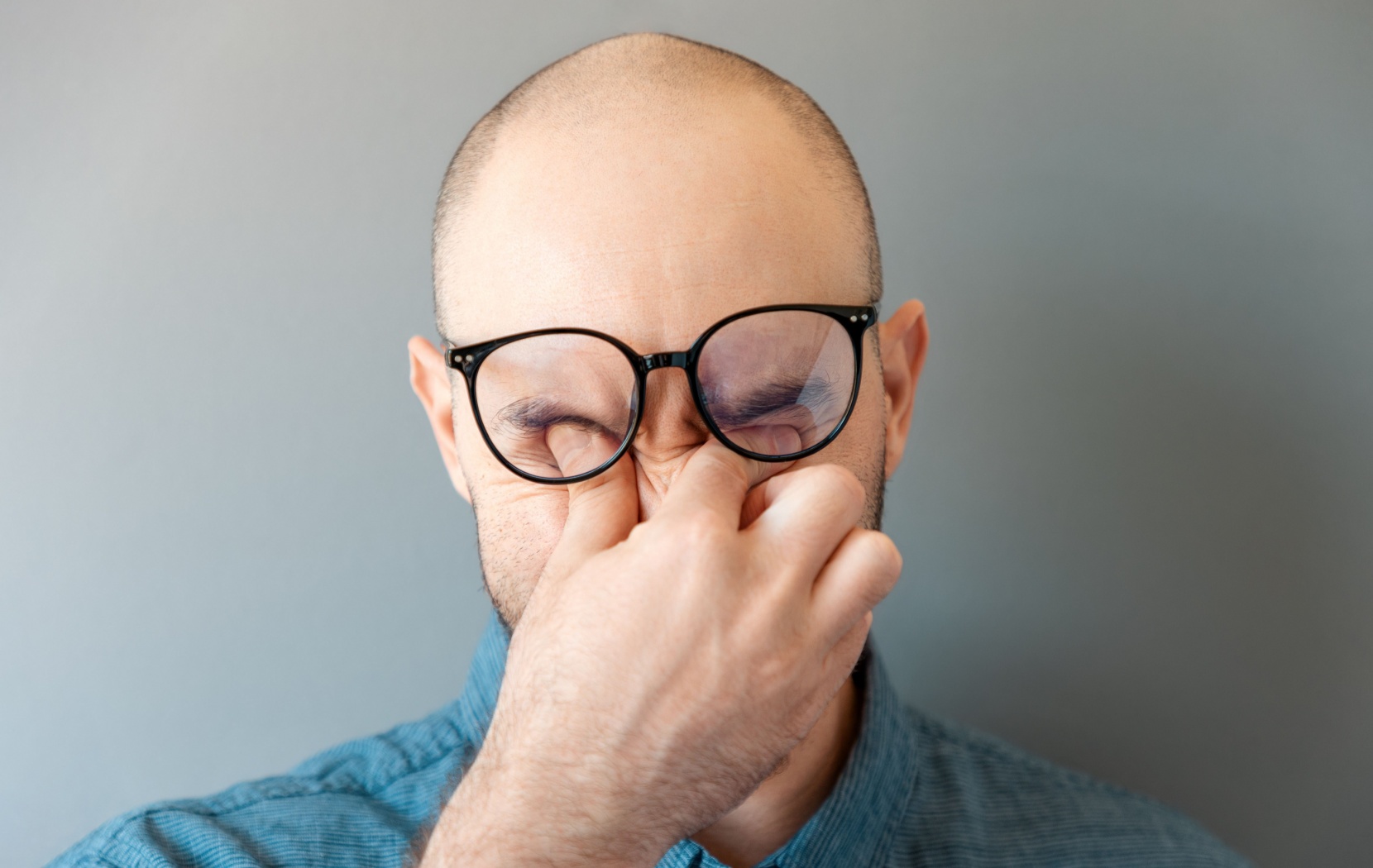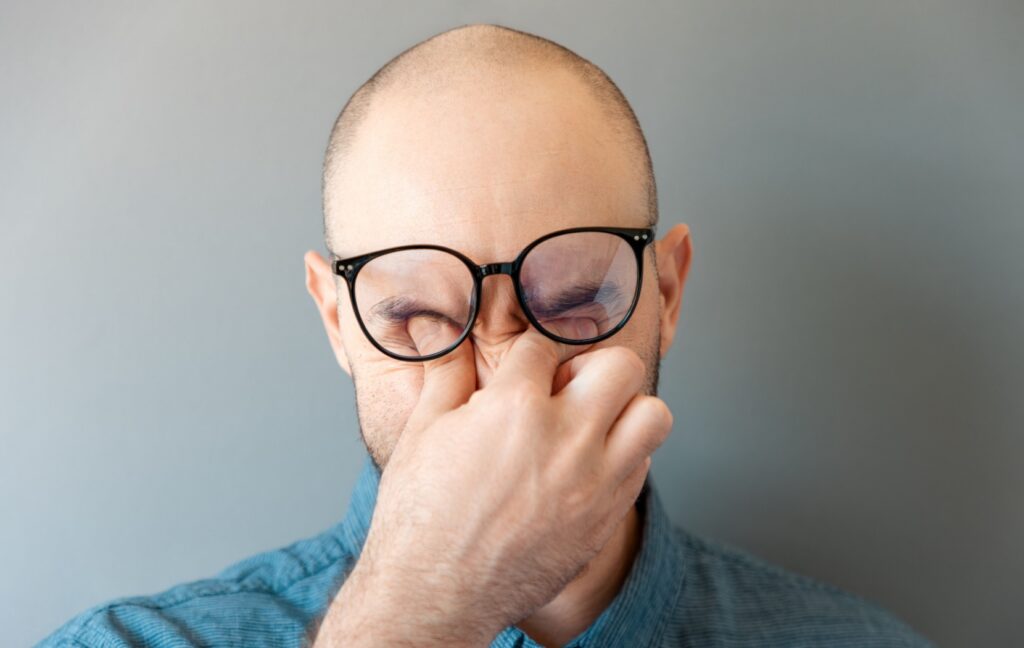If you’ve ever wondered why your vision seems fuzzy after a long day at the computer or why your eyes feel scratchy and unclear, you’re not alone. Dry eye syndrome affects millions of people worldwide and can even cause blurred vision. Understanding this connection is crucial for protecting your eye health and maintaining clear, comfortable vision.
Why Dry Eyes Lead to Blurred Vision
Your tear film does much more than keep your eyes moist. It plays a vital role in maintaining clear vision by creating a smooth, uniform surface on your eye. When this delicate system breaks down, visual problems quickly follow.
The Critical Role of Your Tear Film
Your tear film consists of three essential layers working together:
- Oil layer: Prevents tears from evaporating too quickly
- Water layer: Provides hydration and essential nutrients
- Mucus layer: Helps tears spread evenly across your eye’s surface
When any of these layers becomes compromised, your tear film breaks apart unevenly. This creates an irregular optical surface that prevents light from focusing correctly on your retina, resulting in blurry or fluctuating vision.
How Tear Film Instability Affects Your Sight
Dry eye syndrome can stem from two main issues: insufficient tear production or tears that evaporate too rapidly. Both problems lead to tear film instability, making it difficult for light to refract correctly through your eye. You might notice that your vision clears temporarily when you blink, only to become blurry again moments later.
What Causes Dry Eye Syndrome?
Understanding the root causes of dry eye can help you identify potential triggers and take preventive action.
Age & Hormonal Changes
Tear production naturally decreases as you age, making dry eye increasingly common in older adults. Hormonal fluctuations, particularly during menopause, can significantly worsen eye dryness and related vision problems.
Environmental & Lifestyle Factors
Your surroundings have a significant impact on eye moisture. Dry climates, air conditioning, heating systems, and prolonged screen time can all accelerate tear evaporation. The modern digital lifestyle has made screen-related dry eye particularly prevalent.
Medical Conditions & Medications
Certain health conditions, like Sjögren’s syndrome, diabetes, and autoimmune disorders, can reduce tear production. Additionally, common medications, such as antihistamines, antidepressants, and blood pressure medications, may exacerbate dry eye symptoms.
Effective Treatment Options for Dry Eye
The good news is that dry eye syndrome is highly treatable. Your approach will depend on the severity of your symptoms and underlying causes.
At-Home Remedies
- Artificial tears can provide immediate relief by supplementing your natural tear production. Look for preservative-free options if you need frequent application.
- Omega-3 fatty acids can improve tear quality and reduce inflammation. Include fish like salmon, nuts, and seeds in your diet, or consider high-quality supplements.
- Lifestyle adjustments make a significant difference. Use the 20-20-20 rule during screen time (look at something 20 feet away for 20 seconds every 20 minutes), add humidity to your environment, and protect your eyes from wind and dry air.
Professional Treatment Options
For persistent symptoms, professional treatments can provide long-lasting relief:
- Over-the-counter dry eye regimen: For mild cases of dry eye, over-the-counter eye drops can help to lubricate the eyes and can be used regularly to maintain moisture. Eyelid cleansing can be an important part of managing dry eye. Warm compress using most heat masks and specialized eyelid cleansers can aid in preventing clogged oil glands, reduce inflammation, and improve tear film stability.
- Prescription medications: For more persistent dry eye symptoms, prescription medications may be necessary. These include eye drops that stimulate natural tear production, as well as those designed to reduce inflammation.
- Nutritional supplements: Certain dietary supplements have been shown to support eye health and alleviate dry eye symptoms.
- TempSure Envi: TempSure Envi is an innovative radiofrequency treatment that provides a noninvasive solution, working by gently heating the tissue around the eyes to stimulate collagen production and improve eye hydration.
Prevention Strategies That Work

Taking proactive steps can help prevent dry eye symptoms before they impact your vision:
- Stay well-hydrated and maintain a diet rich in omega-3 fatty acids
- Take regular breaks from screens and digital devices
- Use protective eyewear in windy or dry environments
- Avoid rubbing your eyes, which can worsen symptoms
- Keep your eyelids clean to promote healthy oil flow
- Consider using a humidifier in dry indoor environments
Taking the Next Step Toward Clear Vision
Living with dry eye and blurred vision doesn’t have to be your reality. Modern treatments offer practical solutions that can restore your comfort and visual clarity. The key is working with experienced eye care professionals who understand the complex relationship between dry eye and vision problems. At The Eye Avenue, we specialize in comprehensive dry eye management, from basic treatments to innovative therapies. Our team can help identify the root causes of your symptoms and develop a personalized treatment plan that fits your lifestyle and needs. Schedule your consultation today and take the first step toward clearer, more comfortable vision.




